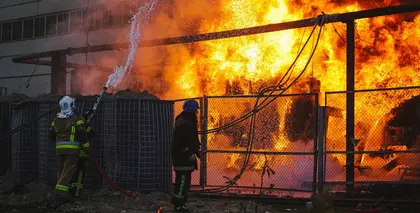President Volodymyr Zelensky declared that 30 percent of the country’s power stations had been knocked out in just eight days – a large proportion in such a short period of time, with outages erupting in the capital’s east.
Until now, attention has been mainly focused on the human casualties and mayhem wrought by Russia’s repeated bombardment of Kyiv and other major cities. However, the impact on the nation’s energy supply now needs to be evaluated, according to an article in the UK newspaper The Guardian.
JOIN US ON TELEGRAM
Follow our coverage of the war on the @Kyivpost_official.
Ukraine was a net energy exporter when fully connected to the European grid, in part thanks to its massive nuclear power plants. However, the president conceded earlier this month that this excess had vanished because the Russian-seized Zaporizhzhia nuclear power plant had been shut down.
Kyrylo Tymoshenko, deputy director of the president’s office, cautioned on national television on Oct. 13 that Ukrainians must be prepared for “rolling blackouts” and that people need to conserve energy. He continued that the nation should be ready for “a harsh winter.”
Ukrainian politicians have issued warnings that Russia may strike the energy grid as winter approaches and temperatures dip as low as -10°C or possibly -20°C. They note that there may not be enough gas available in some frontline regions, such as the Donbas, to heat apartment buildings in which so many people reside.

ISW Russian Offensive Campaign Assessment, January 25, 2025
Some analysts have expressed concern that, should citizens look to flee the country in search of warmth, this could lead to a new migrant crisis. One international relief organization, which wished to remain anonymous, predicted that in addition to the eight million who have already left Ukraine, up to two million more could decide to do so.
On Oct. 17, Ukraine said that it considered Russia’s new approach to be related to Vladimir Putin’s proposal of peace negotiations at the end of September, although Kyiv still views that offer as a ruse to pause fighting so that Russia can regroup and stabilize the frontlines before its next wave of conscripts arrive.
British Defense Secretary Ben Wallace, and Secretary of State for Foreign Commonwealth and Development Affairs, James Cleverly, travelled by plane to Washington to discuss a fresh military aid program for Ukraine which would enhance air defenses. NATO Secretary General Jens Stoltenberg predicted that assistance might arrive within days.
It is believed that Iranian-made Shahed-136 drones are of limited value to Russia on the battlefield and that around three-quarters of them are shot down. However, it is evident that enough of them are surviving to have an impact on energy infrastructure. The situation could quickly get worse if new military aid is not provided soon.
According to top sources, Kyiv has nonetheless prioritized keeping its forces comfortable and supplied with electricity, as any challenges the Ukrainians encounter on the front lines are likely to be shared by the Russian invaders as well.
You can also highlight the text and press Ctrl + Enter










